Czech microwave technology faiths flood demage at University in Buenos Aires
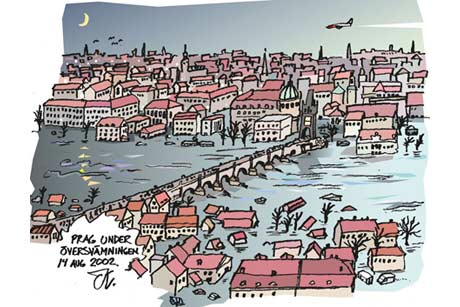
Ilustration: Kaianders Sempler
Prague’s program for the European Union of Science Journalists’ Associations (EUSJA) Study Trip in March for about 30 representatives from abroad met with favourable response. It was organised by the Academic Bulletin, an official magazine of Academy of the Sciences of the Czech Republic (ASCR).The very first result of the Study Trip at Lysolaje Campus came from the Swedish journalist, Kaianders Sempler, who published an article in the journal NyTeknik based on the address of Milan Hájek of the Institute of Chemical Process Fundamentals of ASCR. Professor Hájek spoke on the use of microwave technology to dry books damaged by the 2002 devastating floods in Prague.
This article with illustration came to the attention of the San Martín National University in Buenos Aires that suffered flash floods in early April. Its president Carlos Ruta asked for the assistance and cooperation of the Institute of Chemical Process Fundamentals regarding the drastic consequences of the flooding which affected the University library and its many books. According to University representatives, the methods that exist in Argentina are still very craft-centered and traditional and so they sought expert help from abroad. Professor Hájek of the Institute of Chemical Process Fundamentals confirmed the Institute is assisting in salvaging and restoring thousands of books of the Argentine university.
News
17 Apr 2013 Power up the voice of the scientific crowd!
Association Euroscience asks for help to stimulate the debate around research in Europe. Austerity has taken its toll and disturbed research cycles across Europe. Particularly affected are scientists from Southern Europe. Find out first-hand how scientists confronted to austerity deal with it in Greece, Spain, Italy and Portugal, in a new Special Issue of the Euroscientist, the journal of Euroscience. This issue analyses the situation of how many of scientists were forced to emigrate, and there are also the stories of those who decided to stay. You will hear from researchers sharing their experience of navigating the troubled waters of recession, when it comes to maintaining a seemingly steady research career path.
11 Apr 2013 European science journalists in the Czech Academy
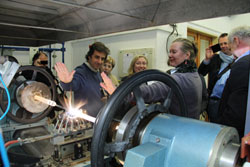 Academic bulletin headed by Editor-in-chief Marina Hužvárová (the Czech EUSJA representative) organized the EUSJA General Assembly, which was held in Prague on March 13–17, 2013. A group of journalists from 22 European countries visited the headquarters of the Academy of Sciences of the Czech Republic and also the Lysolaje Campus for two-day Study Trip. During the first day they were shown around the Academy of Sciences Library and were given a lecture of popularization activities in the Centre of Administration and Operations of ASCR. The tour was closed with an evening concert in the beautiful setting of the Czech Museum of Music. The next day journalists led by the President of the EUSJA Barbara Drillsma (Great Britain) were welcomed at the Institute of Geology (IG) by the President of the ASCR Jiří Drahoš and the IG director Pavel Bosák. After the opening session they visited the institute and also the Laboratory of Optical Fibers of the Institute of Photonics and Electronics. During the afternoon, the group continued to explore the Institute of Experimental Botany (IEB) and Institute of Chemical Process Fundamentals (ICPF), where two guided tours were arranged. After the overview of the institute’s research activities by the director of ICPF Miroslav Punčochář, they visited laboratories of basic and applied research.
Academic bulletin headed by Editor-in-chief Marina Hužvárová (the Czech EUSJA representative) organized the EUSJA General Assembly, which was held in Prague on March 13–17, 2013. A group of journalists from 22 European countries visited the headquarters of the Academy of Sciences of the Czech Republic and also the Lysolaje Campus for two-day Study Trip. During the first day they were shown around the Academy of Sciences Library and were given a lecture of popularization activities in the Centre of Administration and Operations of ASCR. The tour was closed with an evening concert in the beautiful setting of the Czech Museum of Music. The next day journalists led by the President of the EUSJA Barbara Drillsma (Great Britain) were welcomed at the Institute of Geology (IG) by the President of the ASCR Jiří Drahoš and the IG director Pavel Bosák. After the opening session they visited the institute and also the Laboratory of Optical Fibers of the Institute of Photonics and Electronics. During the afternoon, the group continued to explore the Institute of Experimental Botany (IEB) and Institute of Chemical Process Fundamentals (ICPF), where two guided tours were arranged. After the overview of the institute’s research activities by the director of ICPF Miroslav Punčochář, they visited laboratories of basic and applied research.
The European Commission has published 4 Calls for proposals for the year 2013 in the framework of Marie Curie research fellowships (Programme People of the FP7). These fellowships are aimed at post-doctoral researchers, to continue their research at an international level. The fellowships amount is attractive: €87 500 per year for researchers with more than 10 years of experience or €58 500 per year for researchers with a shorter experience. The deadline for the submission of applications is August 14th, 2013.
21 Mar 2013 Discovering the nano-world with bright laser beams of extreme ultraviolet light
Institute of Physics ASCR invites you to a seminar Discovering the nano-world with bright laser beams of extreme ultraviolet light by Carmen S. Menoni of Colorado State University on April 17th, 2013 at 15:00. Prof. Menoni is Fellow of the Institute of Electrical & Electronic Engineers (IEEE), the American Physical Society, and the Optical Society of America. She has served the IEEE Photonics Society as Member of the Board of Governors, Vice-President for Publications and presently is Editor-in-Chief for IEEE Photonics Journal.
20 Feb 2013 Sweeping the Dust from a Cosmic Lobster
A new image from ESO’s VISTA telescope captures a celestial landscape of glowing clouds of gas and tendrils of dust surrounding hot young stars. This infrared view reveals the stellar nursery known as NGC 6357 in a surprising new light. It was taken as part of a VISTA survey that is currently scanning the Milky Way in a bid to map our galaxy’s structure and explain how it formed.
19 Feb 2013 President Václav Klaus reappointed Jiří Drahoš as a head of the Academy of Sciences of the Czech Republic
Physical chemist Jiří Drahoš has been heading the AS CR since 2009. Last December, the Academy Assembly – the highest body of the AS CR responsible for the foremost priority decisions related to the institution, re-elected Professor Jiří Drahoš by a secret ballot as the new candidate for the presidency for the period 2013–2017. Jiří Drahoš said he would like to change the funding of science and was planning to establish a forum for the cooperation of academics and industrialists.
18 Feb 2013 ERC Advanced Grant for Eduard Feireisl
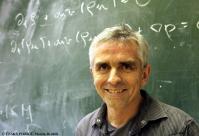 Eduard Feireisl's ERC Advanced Grant proposal "MATHEF – Mathematical Thermodynamics of Fluids" has been selected for funding in the period 2013–2018. A great success of the Czech mathematics as this is the first ERC Advanced Grant for mathematics in the Czech Republic and the only one assigned to a Czech scientist this year. Eduard Feireisl was the chair of the Scientific Committee of the 6th European Congress of Mathematics in Kraków, 2012, and is also the chair of the Scientific Committee of Equadiff 13 in Praha, 2013. A call for a PhD. student to work in the grant is open; for details see the http://www.math.cas.cz/.
Eduard Feireisl's ERC Advanced Grant proposal "MATHEF – Mathematical Thermodynamics of Fluids" has been selected for funding in the period 2013–2018. A great success of the Czech mathematics as this is the first ERC Advanced Grant for mathematics in the Czech Republic and the only one assigned to a Czech scientist this year. Eduard Feireisl was the chair of the Scientific Committee of the 6th European Congress of Mathematics in Kraków, 2012, and is also the chair of the Scientific Committee of Equadiff 13 in Praha, 2013. A call for a PhD. student to work in the grant is open; for details see the http://www.math.cas.cz/.
The recent initiative between the US National Science Foundation (NSF) and European Research Council (ERC) has been taken a step further since last summer. The agreement, which provides opportunities for early-career NSF researchers to join ERC-funded teams in Europe, seems to resonate with ERC grantees; just over 760 already showed great interest in hosting talent from the US.
14 Feb 2013 ERC funds 60 innovative projects to bring 'blue sky' research towards market
The European Research Council (ERC) has announced the outcome of the latest round of its top-up funding scheme 'Proof of Concept'. Worth up to €150,000 each, these grants provide funding for researchers, who are already ERC grantees, to bridge the gap between their research and marketable innovation. In this call, a total of 60 grants have now been awarded, of which the final 27 were made public today. The first 33 grants were announced in September 2012.
11 Feb 2013 The Application of Next Generation Sequencing
Biology Centre CAS, Institute of Plant Molecular Biology in České Budějovice, organizes the 2nd Workshop on the Application of Next Generation Sequencing to Repetitive DNA Analysis in Plants. It will take place on February 13–15, 2013. More information here.
6 Feb 2013 Euroscience Open Calls
 Euroscience is a European non-profit grassroots association open to research professionals, teachers, students, science administrators, policy-makers, etc. and generally to any citizen interested in science and technology and its links with society. It represents not only European scientists of all ages, disciplines and nationalities but also the business sector and public institutions such as universities and research institutes. Euroscience announced the Call for the following events.
Euroscience is a European non-profit grassroots association open to research professionals, teachers, students, science administrators, policy-makers, etc. and generally to any citizen interested in science and technology and its links with society. It represents not only European scientists of all ages, disciplines and nationalities but also the business sector and public institutions such as universities and research institutes. Euroscience announced the Call for the following events.
The Institute of Philosophy of ASCR on November 26–27, 2012 hosted two lectures by Howard Hotson, professor of early modern intellectual history at the University of Oxford and steering committee chair of the Council for the Defence of British Universities. You can read an interview with him.
15 Dec 2012 50 years of ESO – what Europa can achieve when cooperate
The European Southern Observatory (ESO) celebrates fifty years since the signing of its founding convention. Over the last half century ESO has become the world’s most productive ground-based astronomical observatory. The signing of the ESO Convention on October, 5, 1962 and the foundation of ESO was the culmination of the dream of leading astronomers from five European countries — Belgium, France, Germany, the Netherlands and Sweden. They had decided to join forces with the primary goal of building a large telescope that would give them access to the magnificent and rich southern sky. Operating three unique and world-class observing sites in Chile (La Silla, Paranal and Chajnantor) ESO has become a leader in the astronomical research community. To celebrate the 50th anniversary, ESO and its partners (including the Czech Republic) are organising many events and public initiatives during 2012.
15 Nov 2012 Nobel laureates meet Presidents of EU institutions to warn against cuts to the EU research budget
A delegation led by Nobel laureates meets the President of the European Parliament Martin Schulz, the President of the European Council Herman Van Rompuy and the President of the European Commission José Manuel Barroso, to urge EU leaders to secure the future budget for research and innovation Horizon 2020. They will hand in an open letter, signed by 44 Nobel laureates and 6 Fields medallists, warning against the dramatic consequences of possible budget cuts in research and innovation. The delegation will also draw attention to a petition “No cuts on research” in support of this cause; to date signed by over 131 000 citizens in Europe and across the globe. These Europe-wide initiatives are launched ahead of the 22-23 November European summit on the overall EU budget for 2014 till 2020.
26 Oct 2012 Statement by the ERC Scientific Council on the Open Letter from 42 Nobel laureates to EU leaders
On 23 October, 42 Nobel laureates and 5 Fields medallists warned against cutting the future EU research budget, in an open letter addressed to EU Heads of State or Government and Presidents of EU institutions. This appeal comes ahead of a special European summit on 22 and 23 November, where leaders will decide the overall EU budget for 2014 till 2020. Researchers from various scientific fields and different parts of Europe immediately responded to the open letter by launching a petition for securing the EU research and innovation budget. The ERC Scientific Council is overwhelmed by the resonance the open letter had in the research community and in the media. The letter was published by over 20 top newspapers across Europe. The online petition has collected over 40,000 signatures in the first day, and the Scientific Council expects that many more researchers will rally to support this call, initiated by the younger generation.
18 Oct 2012 Science and Research evaluation and financing is discussed at the Embassy of Germany16 Oct 2012 Conference of the Internationale Union of Academies in Prague
The president of the Academy of Sciences of the Czech Republic Jiří Drahoš welcomed the representatives of the Union Académique Internationale on October 7–9, 2012 at Prague villa Lanna. The federation is composed of national and international academies from more than 70 countries working in the field of Humanities and the Social Sciences. Purpose of the federation is to encourage cooperation to advance studies through collaborative research and joint publications in those branches of humanities and social sciences promoted by the Academies and Institutions represented in the UAI which include philology, archeology, history, moral sciences and political sciences. The Academy of Sciences of Czech Republic is represented in UAI by member of the Academy Council Jiří Beneš from the Institute of Philosophy ASCR.
10 Oct 2012 The construction of the Extreme Light Infrastructure launched
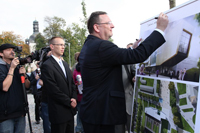 The construction of the ELI Beamlines centre with the world´s most efficient laser for seven billion crowns, most of which will be funded by the European Union, started in Dolní Břežany on 9th October 2012. According to Prime Minister Petr Nečas the project represents a very important stimulation for Czech science, also because it will be the biggest and most important scientific installation in the Czech Lands. The center will focus on research into cancer treatment, medical imaging and diagnosing. The laser will also be used in the development and testing of new materials and the handling of radioactive waste. More information you can find on http://www.eli-beams.eu/about/.
The construction of the ELI Beamlines centre with the world´s most efficient laser for seven billion crowns, most of which will be funded by the European Union, started in Dolní Břežany on 9th October 2012. According to Prime Minister Petr Nečas the project represents a very important stimulation for Czech science, also because it will be the biggest and most important scientific installation in the Czech Lands. The center will focus on research into cancer treatment, medical imaging and diagnosing. The laser will also be used in the development and testing of new materials and the handling of radioactive waste. More information you can find on http://www.eli-beams.eu/about/.
The Euroscience Open Forum 2012 took place at the Convention Centre Dublin and it was officially opened by President of Ireland, Michael D. Higgins. More than 500 speakers addressed over 150 science, careers and business to business sessions. The opening ceremony also featured the first keynote address of the conference by Nobel Laureate Jules Hoffmann entitled From Insects to Mammals, reflections on a European journey through basic research on immune defences. Over the four days of the Forum, leading scientists, policy makers, business leaders and the general public from across the world came together to discuss new discoveries and debate the direction that research is taking in the sciences in order to strengthen the links between science and society. The conference covered all of the current major global scientific challenges, including health, food, genetics and climate change.
6 Sep 2012 Comprehensive transcriptome analysis of human ENCODE cells
ENCODE, an international research project led by the National Human Genome Research Institute (NHGRI), has produced and analyzed 1649 data sets designed to annotate functional elements of the entire human genome. Data on transcription starting sites (TSS) contributed by a research team at the RIKEN Omics Science Center provided key anchor points linking the epigenetic status of genes observed at the 5' end directly to their RNA output.

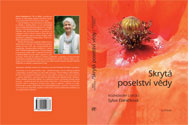


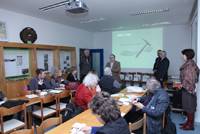


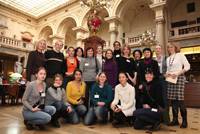

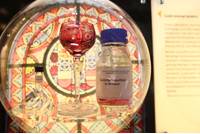
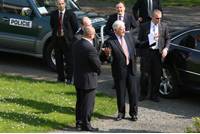
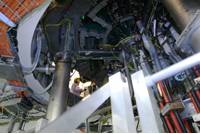
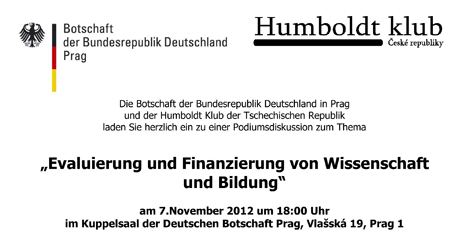


 Česky
Česky
